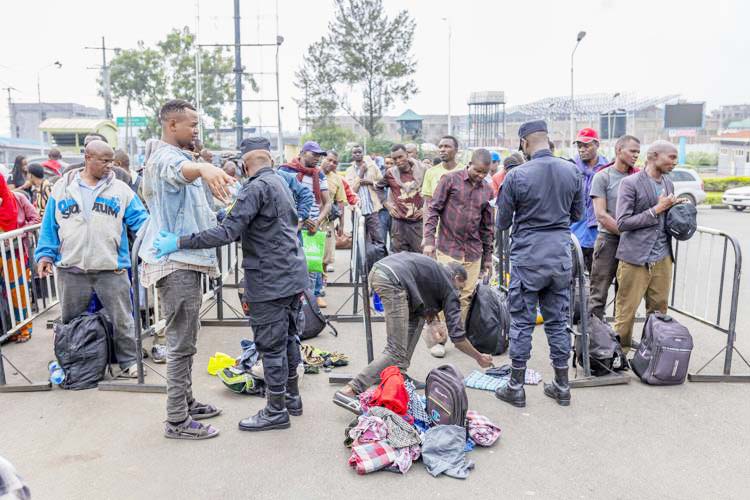GOMA, Jan 30: Rebel groups supported by Rwanda captured additional towns in eastern Congo on Wednesday, advancing beyond the pivotal city of Goma in a bid to increase their territorial control in this war-torn region.
The rebels have moved towards the heart of South Kivu province after overtaking several towns, including Kalungu, Kanyezire, and Mukwinja, as reported by a local civil society leader and an aid worker who chose to remain anonymous due to media restrictions.
UN spokesman Stephane Dujarric expressed concern over the situation, noting that the United Nations is implementing measures to safeguard civilians and UN personnel. The rebels’ advance has sparked fears of a prolonged occupation, as they have indicated plans to establish a new government in Goma, a city home to 2 million residents.
“If left unchecked, the conflict could escalate… stirring memories of the atrocities from the late 1990s and early 2000s, when millions perished,” said the Crisis Group, referencing a previous multi-national war in the area.
In contrast to their brief capture of Goma in 2012, when international pressure forced them to withdraw after only a few days, the current situation seems more precarious.
Congolese President Felix Tshisekedi was notably absent from a virtual summit held by a regional East African organization late Wednesday, which was hosted by Kenya. He was attending an official visit to Angola, which had brokered a ceasefire between Congo and Rwanda last year, as stated by the Angolan presidency. Tshisekedi intended to address the circumstances in eastern Congo with Angola’s President João Lourenço.
In light of the rebel offensive, many Congolese soldiers, including mercenaries, were surrendering at the border with Rwanda. The Congolese army appeared disorganized, with troops at the border lacking the appropriate resources for any significant confrontation.
A spokesperson for the rebels reported that nearly 300 mercenaries have surrendered their weapons and returned to their home countries.
“Residents of Goma should remain calm; peace has arrived,” claimed Willy Ngoma, a representative of the M23 group, who is on the UN Security Council’s sanctions list for his actions against civilians.
“It’s akin to fighting without any command,” mentioned Jean Marie Ndahambaza, a soldier who decided to surrender.
Various armed factions have long contended for dominance in eastern Congo, a region abundant in minerals vital for global technology, which has been a battleground for proxy conflicts involving Congo and nearby Rwanda, alongside other powers. Fighting reignited this week, with the M23 rebels, who are backed by Rwanda, declaring on Monday that they had taken control of much of Goma.
As the conflict intensifies, many Goma residents are seeking refuge from the violence, with some fleeing deeper into Congo for safety, while others are crossing into neighboring Rwanda.
Rwandan border patrols are conducting checks on belongings carried by those entering the country, who travel with suitcases and children. The displaced individuals, visibly worn yet relieved, were assisted by the Rwandan Red Cross.
In a significant development, rebels have seized control of Goma’s airport, raising alarms about a potential breakdown of law and order in the city “given the proliferation of weapons,” according to UN spokesman Dujarric.
Confrontations with rebels persisted in parts of Goma Wednesday afternoon, specifically in core neighborhoods such as Katoyi and Kahembe. Other areas were relatively calm, a day after numerous residents sought refuge roadside as missiles soared overhead, with injured civilians flooding into already overwhelmed hospitals.
Tshisekedi was expected to deliver a public statement later on Wednesday, marking his first comments since the rebels seized Goma.
The turmoil has its origins in long-standing ethnic tensions, as the M23 claims to protect the ethnic Tutsi population in Congo. Rwanda contends that Tutsis are facing persecution from Hutus and remnants of militias involved in the 1994 genocide that claimed 800,000 Tutsi lives and others. Many Hutus sought refuge in Congo post-genocide.
Experts assert that the underlying struggle is for the control of Congo’s extensive mineral wealth, estimated to be worth $24 trillion, essential for global technology. M23 rebels appear inclined to establish a permanent presence in Congo, discussing plans to create a government and facilitate the return of displaced individuals.
Experts warn that achieving a rebel withdrawal might prove more challenging than in 2012 when the M23 first occupied Goma. Murithi Mutiga, the Crisis Group’s Africa program director, noted that the group has gained confidence due to Rwanda’s backing, which believes Congo is neglecting its regional interests and failing to adhere to prior peace agreements.
While Rwandan leaders, predominantly Tutsis, have denied supporting the rebels, UN officials estimate that approximately 4,000 Rwandan troops are present in Congo.
In a strong response, South African President Cyril Ramaphosa, whose forces contribute to peacekeeping efforts in Congo, attributed the violence to “Rwanda Defense Force militia” and called for the rebels’ withdrawal.
“The territorial integrity of Congo must be upheld,” stated Ramaphosa, promising that South Africa would ensure its peacekeepers are “well-equipped and adequately supported” during this critical mission.
Rwandan President Paul Kagame remarked on X that he discussed with U.S. Secretary of State Marco Rubio the necessity for a ceasefire and addressing the root causes of the conflict comprehensively.
In related news, Kenya Airways announced the cancellation of all flights to Kinshasa on Wednesday following reports of looting and arson at least ten foreign embassy buildings in the capital the day prior, as confirmed by a company representative at Kinshasa airport. (AP)


Leave a Reply